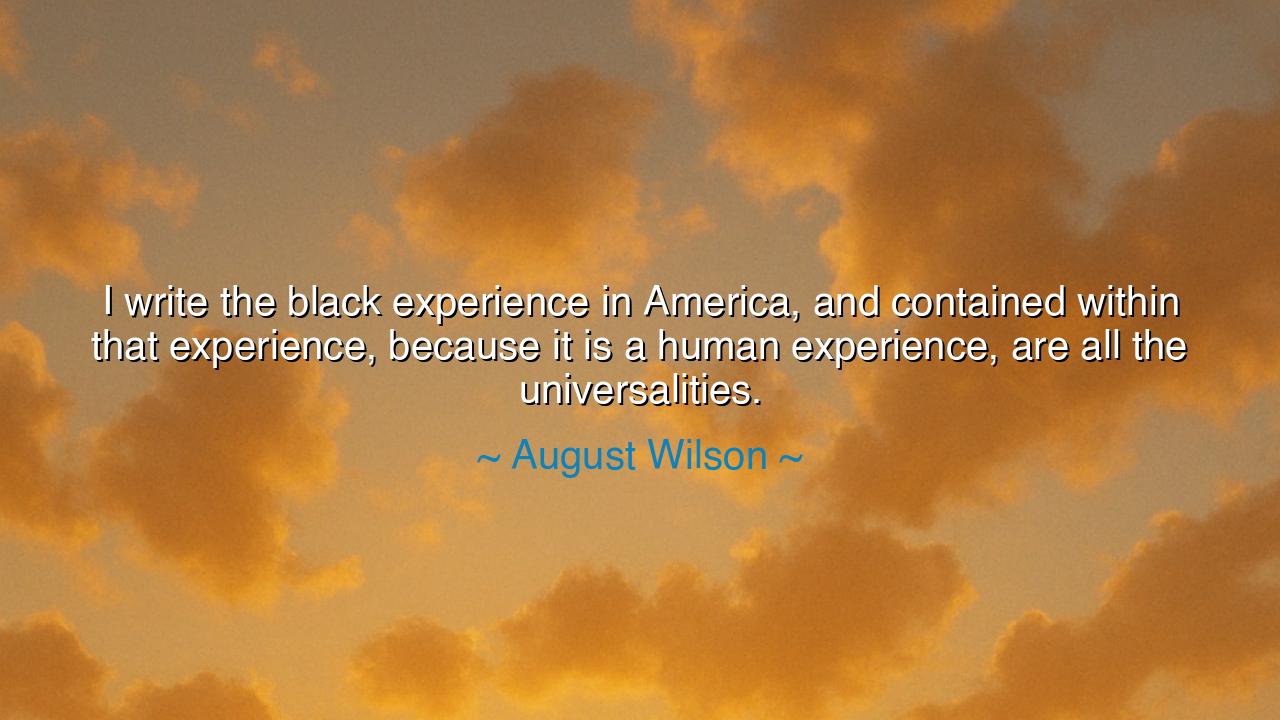
I write the black experience in America, and contained within
I write the black experience in America, and contained within that experience, because it is a human experience, are all the universalities.






The soft murmur of the café filled the space, blending with the gentle sound of rain against the window. Jack sat across from Jeeny, his coffee cup cradled in his hands, his gaze fixed on the rain-soaked streets outside. Jeeny, sitting opposite him, seemed deep in thought, her fingers tracing the rim of her cup.
Host: After a brief moment of silence, Jeeny spoke, her voice calm but filled with deep reflection.
Jeeny: “I came across a quote from August Wilson today that made me think about storytelling and the human experience. He said, ‘I write the black experience in America, and contained within that experience, because it is a human experience, are all the universalities.’ What do you think about that? Do you think that by telling specific stories, we also touch on universal truths?”
Jack: He looked up, a thoughtful expression crossing his face. “I think Wilson is absolutely right. The personal and the universal are often much closer than we realize. By sharing a particular experience, like the black experience in America, you can reveal something deeply human that resonates with people from all walks of life. The specific struggles, joys, and challenges of one group can speak to universal themes of identity, family, love, and survival.”
Jeeny: “Exactly. The richness of a specific cultural experience doesn’t take away from its universality—it enhances it. When you dive deeply into someone’s personal experience, whether it’s based on race, class, or background, you often find that the emotions and struggles are shared by everyone. It’s about how those themes transcend any one individual or community. Humanity is so much more connected than we sometimes think.”
Host: The rain outside had softened, leaving a quiet stillness in the café. Jack shifted slightly, his fingers resting on his coffee cup as he continued.
Jack: “That’s what makes storytelling so powerful. When someone shares their story, they’re not just telling their own life—they’re telling a story that is connected to the broader human experience. Wilson’s ability to take the black experience in America and present it as a universal truth is what makes his work so impactful. It’s not just about race or identity—it’s about the human condition, and the way people navigate their place in the world.”
Jeeny: “Yes, and that’s what makes his work so deeply relevant. The themes he touches on—struggle, identity, dreams, disappointment—are things everyone can relate to, no matter where they come from. The specific details of his characters’ lives make their stories rich and real, but the emotions they go through echo the universal experiences of anyone facing adversity or seeking belonging.”
Host: The conversation seemed to deepen, as if they were both reflecting on the nature of storytelling itself. Jack set his cup down gently, his expression softening as he thought about the impact of Wilson’s work.
Jack: “I think Wilson’s quote is a reminder that stories—especially ones about marginalized or overlooked communities—are so important because they reveal something about the wider human experience. Sharing these experiences doesn’t just help us understand the people in them—it helps us understand ourselves, too. The more we hear each other’s stories, the more we realize how connected we really are.”
Jeeny: Her smile was small but filled with understanding. “Exactly. It’s through these stories that we see our shared humanity. The particularities of a specific experience don’t separate us—they bring us closer. Wilson’s work shows us that by sharing the black experience in America, he’s not just telling one group’s story; he’s telling the story of all of us.”
Host: The rain outside had stopped, leaving a quiet calm in its wake. Jack and Jeeny sat in the realization that the beauty of storytelling lies not in the specificity of a life, but in its ability to reveal the universal truths that connect all of humanity. August Wilson’s words serve as a reminder that through the lens of one person’s experience, we can see reflections of ourselves, and through those reflections, we grow closer to understanding what it means to be human.






AAdministratorAdministrator
Welcome, honored guests. Please leave a comment, we will respond soon